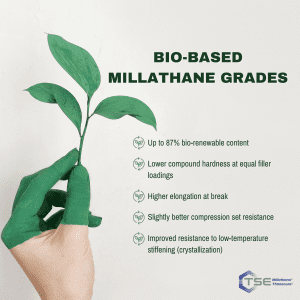 Millathane is advancing its commitment to sustainability by offering a more environmentally friendly alternative to traditional polyurethane polymers. While the standard Millathane polymers use fossil-based raw materials, the new bio-based Millathane polymers provide similar performance with a reduced environmental impact.
Millathane is advancing its commitment to sustainability by offering a more environmentally friendly alternative to traditional polyurethane polymers. While the standard Millathane polymers use fossil-based raw materials, the new bio-based Millathane polymers provide similar performance with a reduced environmental impact.
Our eco-friendly Millathane polymers utilize polyols derived from non-food plant crops. This marks a significant shift towards renewable resources. To date, we’ve successfully developed three bio-based grades that closely mirror the physical properties of our standard Millathane E34, Millathane 55, and Millathane 26 polymers. These eco-friendly alternatives boast impressive bio-content percentages: 85% for bio-based Millathane E34, 77% for Millathane 55, and 87% for Millathane 26.
In typical test formulations, bio-based Millathane polymers performed similarly to traditional ones. In some cases, they performed even better. They exhibited lower hardness at the same filler loading. They also demonstrated higher elongation at break and improved low-temperature properties. Additionally, they offered slightly better compression set resistance. These enhancements, along with their renewable origins, make our bio-based Millathane polymers an excellent choice. They are ideal for environmentally conscious manufacturers seeking high-performance materials.

